
Research

Our lab is interested in how coastal marine organisms are responding, acclimating, and adapting to human-altered environments.

PC: Alex Hatch, UNH COLSA Communications






Photo Credit: Alex Hatch
Climate Change and Animal Behavior
We are investigating the effects of ocean acidification on animal behavior by focusing on predator cue detection and anti-predator behavior under low pH conditions we expect for future coastal areas. We use snails, lobsters, and bivalves for this work to study their response in the lab by exposing individuals to various levels of pH and tracking their behavior after contact with chemical cues from food and predators.
Ocean Change and Species Interactions
Recent work has focused primarily on the impairment of acidification on individual shell-building species. However, research in our lab seeks to include species interactions to gain a broader perspective on the effects of elevated CO2 at the scale of communities. In order to build on our work with ocean acidification and animal behavior we also look at how changes in prey traits alter the outcome of interactions between predators and prey and how altered behavior in prey species leads to changes in their feeding on lower trophic levels.
Ocean Change and Adaptation: Geographic Variation in Responses
Another branch of our research explores the adaptive capacity of coastal organisms to projected multi-stressor conditions such as coastal acidification, ocean warming, and noise by exploring geographic variation in tolerance to shifts in environmental stressors. This work involves field work to characterize the environmental conditions and laboratory experiments to assess the phenotypic response of different populations.
Multiple Stressors and Early Life History Physiology
Another branch of our research program aims to understand how co- occurring stressors in the marine realm influence the development and health of early life history stages of economically and ecologically important invertebrates such as the American lobster. This work involves behavioral, biochemical, and developmental assays to determine how environmental change is likely to alter these vulnerable stages.
A new research program in our lab involves assessing the health of bivalves insitu and in real time using remote sensors to monitor their behavior. This work is in collaboration with the Quantitative Marine Ecology Lab at UNH and will involve deployments involving local oyster farms. Oyster aquaculture is a growing industry in NH and this work aims to identify factors that could enhance production and restoration of oysters.
Stressor Carry Over Effects in Bivalves
Aquaculture and Cumulative Stressors
A new research program in our lab involves assessing the health of bivalve larval settlement in response to cumulative stressors such as anthropogenic sound and ocean warming. This work is in collaboration with the SEA BABEL lab at UNH and the sustainable seafood center at UNH and will involve lab experiments and deployments at local bivalve farms.